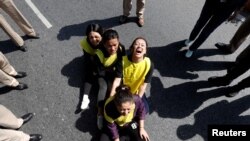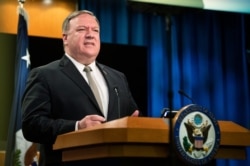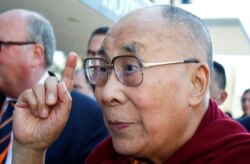The United States said Tuesday it was restricting visas to Chinese officials over Tibet, renewing a call for "meaningful autonomy" in the predominantly Buddhist region.
Secretary of State Mike Pompeo said he was taking action against an unspecified number of officials under a new U.S. law that presses China to let Americans visit Tibet.
"Unfortunately, Beijing has continued systematically to obstruct travel to the Tibetan Autonomous Region and other Tibetan areas by US diplomats and other officials, journalists and tourists, while PRC officials and other citizens enjoy far greater access to the United States," Pompeo said in a statement.
Pompeo restricted visas to Chinese officials determined to be "substantially involved" in the exclusion of foreigners from Tibetan areas.
The State Department declined to name the officials or say how many people were affected, citing U.S. confidentiality laws.
Amid high tension with China, the United States has increasingly been issuing such visa sanctions, earlier taking action over Beijing's clampdown on free expression in Hong Kong and its ongoing incarceration of some one million Uighurs and other Turkic Muslims.
The Tibet action comes under a 2018 law passed by Congress that aims to pressure China over its tight restrictions in the Himalayan region.
Human rights groups say that Tibetans live under strict surveillance with the threat of jail or abuse for any signs of a non-Chinese identity, including possessing images of the Dalai Lama, their exiled spiritual leader.
Beijing has largely barred foreign journalists from visiting Tibet since 2008, when the region saw a wave of self-immolations as protests, and has not responded to U.S. requests to set up a consulate in the regional capital Lhasa.
By contrast, the law notes that Chinese nationals admitted to the United States face no restrictions on visiting any part of the country.
'A clear message'
The International Campaign for Tibet, a rights advocacy group close to the Dalai Lama, welcomed the implementation of the law.
"The U.S. is sending Beijing a clear message that it will face consequences for its human rights abuses and continued isolation of Tibet from the outside world," said the group's president, Matteo Mecacci.
The campaign said it saw momentum, pointing to a recent joint call by 57 European parliamentarians from 19 countries to set up their own version of the Reciprocal Access to Tibet Act.
A British MP has also introduced similar legislation.
"China's oppression of the Tibetan people won't stop tomorrow even with this law's implementation," Mecacci said.
"But international pressure on the Chinese government to open up Tibet to the outside world is a vital step toward bringing justice and human rights back to Tibet."
The U.S. action comes one day after the 85th birthday of the Dalai Lama, who has spent most of his life in exile in India.
While the Dalai Lama is believed to be in good health, the charismatic monk has reduced his once constant travel, raising fears that the spotlight on Tibet will fade without him.






